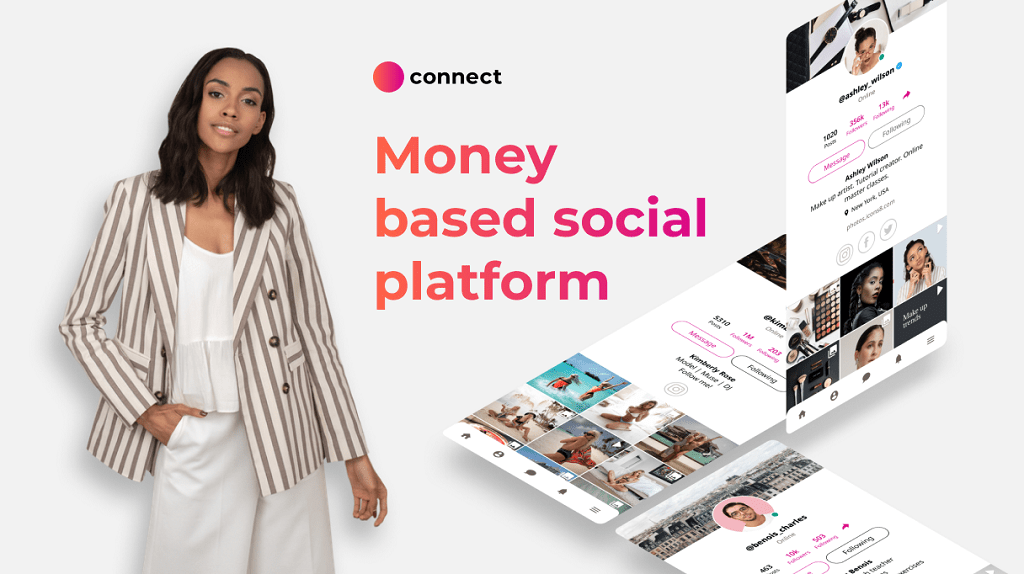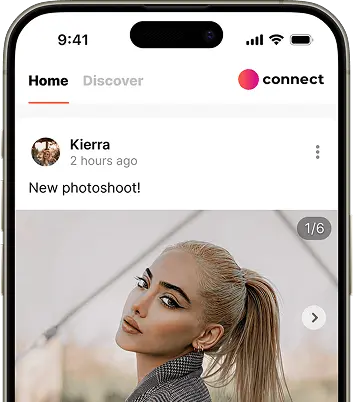Top-7 White Label Social Media Platforms
Looking to launch your own social platform? Discover the top white label social media platforms in 2026 — and why Scrile Connect is the best choice for building a fully branded, monetized community from scratch.

white label social network platform
Everyone’s tired of building on borrowed platforms. Creators want independence. Coaches need private hubs. Local communities and niche brands are looking for control, not another algorithm.
A white label social media platform gives you exactly that. It’s a fully customizable system that lets you launch a social network with your own branding, features, and domain. No third-party logos, no forced layouts — just your voice, your interface, your rules.
With a white label social media setup, you skip years of development. Instead, you get a ready-made structure with feeds, messaging, subscriptions, and group functions — all made to feel like yours.
In this article, you’ll find seven serious contenders that offer real flexibility, privacy, and monetization potential. These aren’t gimmicks. They’re full-scale tools for anyone ready to own their platform instead of renting space on someone else’s.
| Platform 🚀 | Best for in 2026 🎯 | Customization & ownership 🎨 | Monetization options 💰 | When it makes sense / trade-offs 🧩 |
|---|---|---|---|---|
| Honeycommb | Premium, mobile-first creator or brand communities | Strong control of branding in native apps (iOS/Android), but backend is closed | Memberships, digital products, donations | Great if you want polished branded apps fast; less ideal if you need self-hosting or code-level tweaks |
| Disciple | Solo creators, coaches, bands, fitness leaders with loyal niches | Web + app layout theming, but within fixed templates | Subscriptions, in-app purchases, merch store links | Good for quick launch without coding; limited design depth and some revenue share via app stores |
| Mighty Networks | Online schools, cohort programs, business communities | Solid visual branding and structured flows, but tied to their course/community model | Paid communities, courses, events via Stripe | Ideal if your main value is courses + community; less flexible if you want a very unconventional UX |
| Bettermode | Brands building structured web communities (support, customer hub) | Clean layouts, spaces and widgets on your own domain, no deep backend access | Indirect (upsells, support communities), not creator-first tools | Strong choice for customer communities; weaker fit for entertainment or fan-focused experiences |
| Ning | Publishers, bloggers, educators building multi-feature networks | High site-level flexibility (CSS, layouts, modules) with a more old-school UI | Paid access, donations, basic paid content | Works if you like tinkering and don’t need a very modern app feel or heavy integrations |
| Circle | Coaching cohorts, masterminds, private paid groups & programs | Modern, clean UI with decent branding; deep design changes require Enterprise | Subscriptions, paid communities, events via Stripe | Perfect for simple, focused member hubs; not ideal if you need extreme visual or technical freedom |
| Scrile Connect | Entrepreneurs & brands needing a fully custom social platform | Full white-label + custom UX/UI, flows, policies, even database & hosting stack | Subscriptions, PPV, tips, content sales and more, under your brand | Best when you want to own the platform (and data) long-term; requires planning and real dev budget |
What Is a White Label Social Media Platform — And Why Build One?

Pre-made white label media platform means you get a template you can reskin and rename from a dead start. You receive a design for a social network — profiles, feeds, messages, payment — no logos, no colors, no templates are fixed. You decide what it looks like, what it can offer, who can be its members.
It’s not a Facebook group or a Discord channel. You are neither taking over a third-party’s page. You are creating your own place – a white label social network hosted under your very own page, with your very own name, with your very own terms.
That’s why business operators and content creators are abandoning traditional sites:
- Branding: Every pixel is yours. No third-party watermarks or unwanted UI.
- Monetization: Charge for access, run subscriptions, or sell content directly.
- Privacy & data control: You own the user data — not a giant ad company.
- Niche community building: Build tailored experiences for specific audiences — no chasing likes, no algorithm interference.
Brands are using white label social media software to create private communities, member clubs, creator hubs, learning networks, and even fan-driven ecosystems. Instead of bending to the limits of existing platforms, they’re starting with a foundation they control and scaling it on their terms.
If you’ve ever said, “I wish I had my own version of that,” this is how it happens.
How to Choose the Right White Label Social Media Solution
Picking a white label social network platform isn’t just about who has the flashiest demo. It’s about what you can actually control — and how much of your community you truly own.
Here’s what to look for before signing up or signing off:
- Customization depth: Can you change design, features, flows — or just upload a logo?
- Mobile vs. web-first: Does it support native apps, or is it a browser-only build?
- Analytics & admin tools: You need real control — not just a user count and a mute button.
- Monetization support: Subscriptions, paywalls, tips, affiliate features — are they built in?
- Hosting & security: Who owns the servers? How is user data handled and stored?
The right solution should feel like your platform from day one — not like a white label product with a bandaid logo slapped on. Make sure you’re not boxed in by pricing tiers, user caps, or backend limitations. If it’s not fully yours, you’ll end up rebuilding later.
Top-7 White Label Social Media Platforms in 2026
You’ve seen the rise of closed communities, paid member groups, and branded spaces for everything from coaching to crypto. Behind those polished social networks? White label platforms built to let someone else shine — you. Below are seven standout options, each offering a unique balance of features, flexibility, and ownership.
Let’s break them down — real pros, real gaps, real costs.
Honeycommb
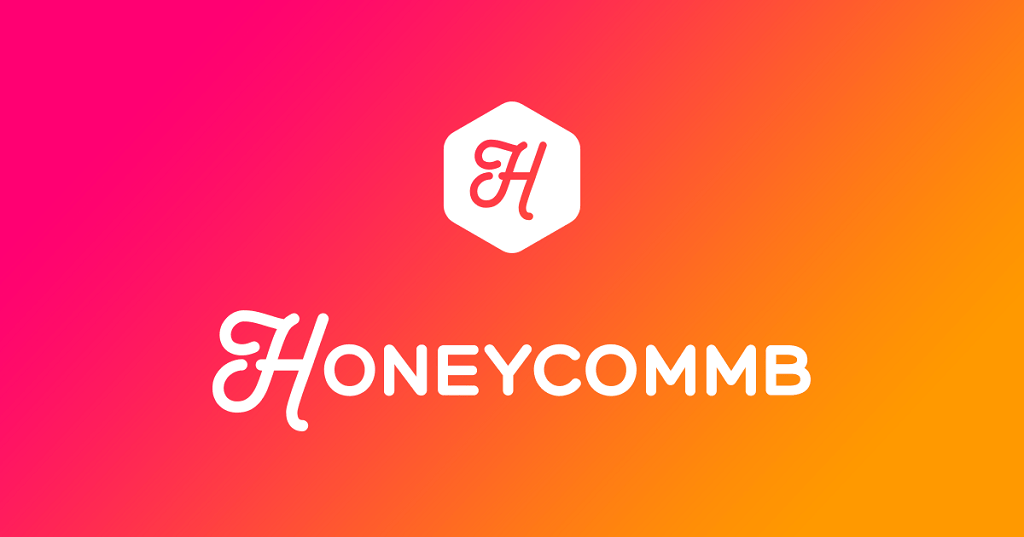
Honeycommb is all about polish. It’s built for businesses that want premium mobile-first social apps with powerful branding and solid scalability. Think creators, wellness communities, and even sports teams that need a dedicated app in the App Store with full community features baked in.
Best for: Premium mobile communities with design-first branding needs
Pros:
- Gorgeous native apps (iOS + Android) under your own name
- Built-in monetization: memberships, digital products, donations
- Full design and UI customization
- Active push notifications and in-app engagement tools
Cons:
- Higher pricing tiers
- No self-hosting or code-level customization
Flexibility: Solid branding control, limited backend customization
Disciple
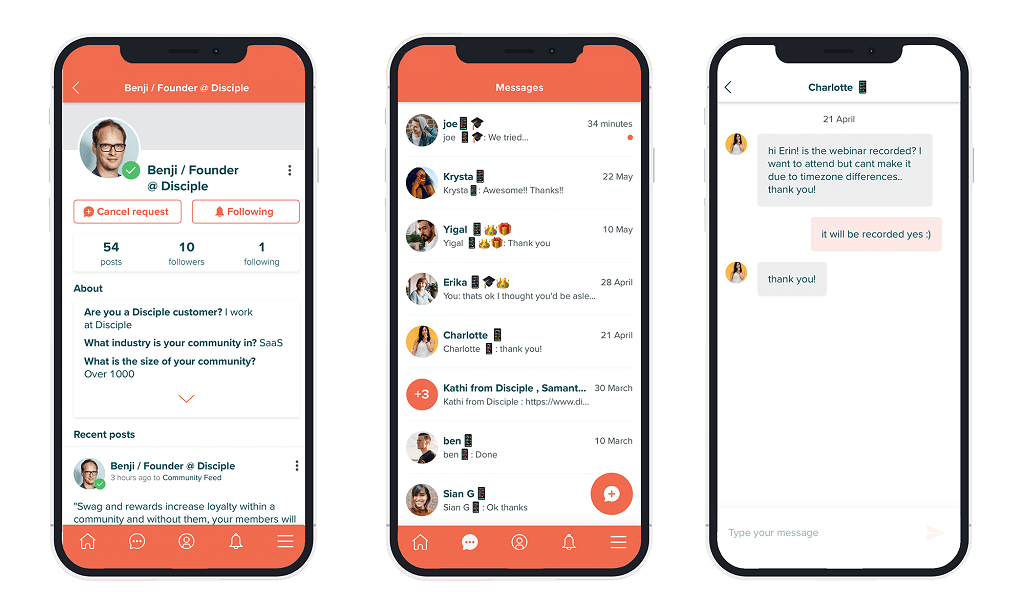
Disciple is designed for communities that want to own their fanbase instead of renting it on Facebook or Instagram. It’s ideal for solo creators, coaches, and small brands who want an app + web experience without touching a single line of code.
Best for: Coaches, musicians, fitness leaders — anyone with a loyal niche
Pros:
- Easy-to-use dashboard and onboarding
- Web + mobile presence with brandable layout
- Subscriptions, in-app purchases, and merch store integration
- Content feed, groups, events, and livestream features
Cons:
- Limited design control (themes > real customization)
- Revenue share on in-app purchases (through Apple/Google)
Flexibility: Great for launching fast, less so for deep dev control
Mighty Networks
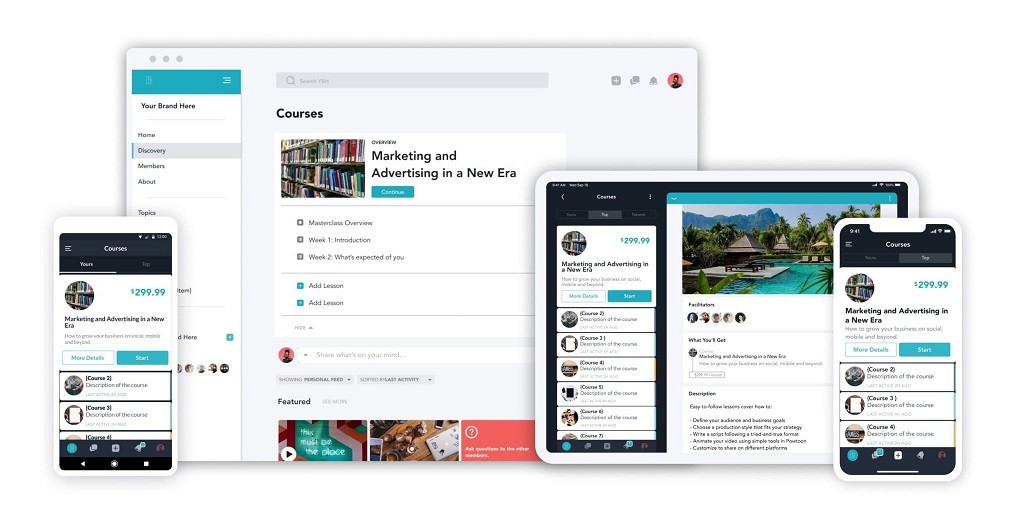
Mighty Networks nails the “community meets learning” model. It’s popular with digital educators who want courses, events, and member interaction all in one place — without duct-taping tools together.
Best for: Online schools, cohort courses, business communities
Pros:
- Native courses and event tools built into the platform
- Community feed, chat, and subgroups
- Mobile app with your brand name
- Stripe integration for paid content access
Cons:
- Limited visual branding beyond logos/colors
- Higher tiers required for advanced monetization tools
Flexibility: Mid-level — structured around their learning flow and templates
Bettermode
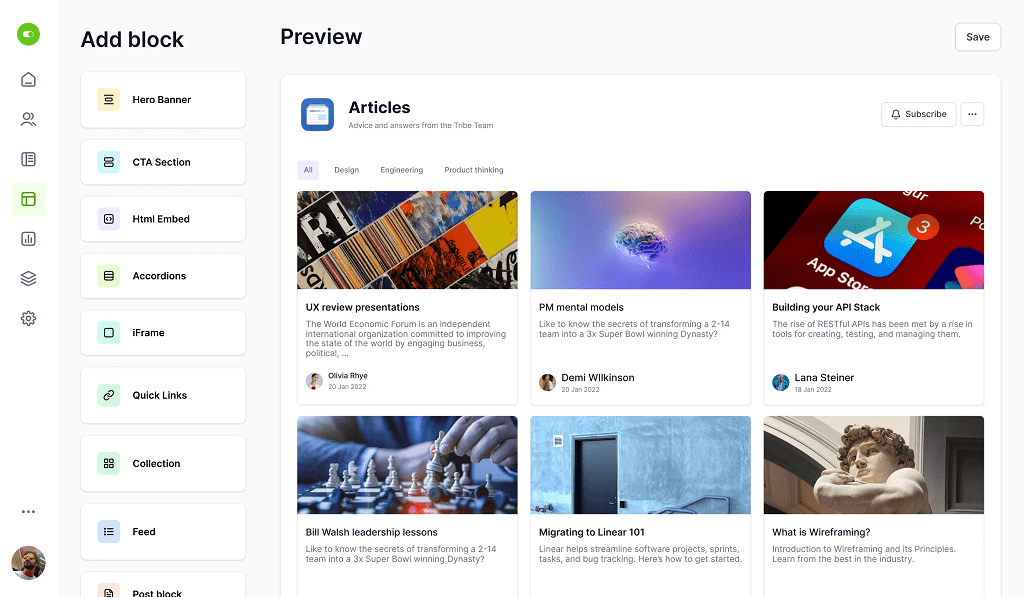
Bettermode used to be called Tribe, and that name still fits the vibe. It’s a platform built for structured, clean-looking online communities where the content and conversations stay easy to follow. Brands use it for support forums, private customer networks, and even internal social feeds.
Best for: Businesses that want structured, web-first social platforms
Pros:
- Clean, minimalist interface with widgets and layout blocks
- Easy to set up user roles, topic spaces, and activity feeds
- Integrates with tools like HubSpot, Zapier, and Slack
- Custom domain and branding options
Cons:
- Web-first focus, no native mobile apps included
- Not built for creators or entertainment-style use
Flexibility: Solid control of frontend and integrations, backend is closed
Ning
Ning has been around for a while, but it’s still one of the most flexible platforms for people who want a full website that acts like a social network. If you’re building a niche portal with blogs, media uploads, groups, and forums all under one roof — this one still holds up.
Best for: Bloggers, community publishers, educators building multi-feature networks
Pros:
- Full-featured site builder: forums, blogs, events, media uploads
- Drag-and-drop layouts with custom CSS options
- Built-in monetization (paid access, donations)
- Mobile-friendly and SEO tools included
Cons:
- Dated UI compared to newer platforms
- Limited third-party integrations
Flexibility: High — great for hands-on builders who don’t mind digging into settings
Circle.so
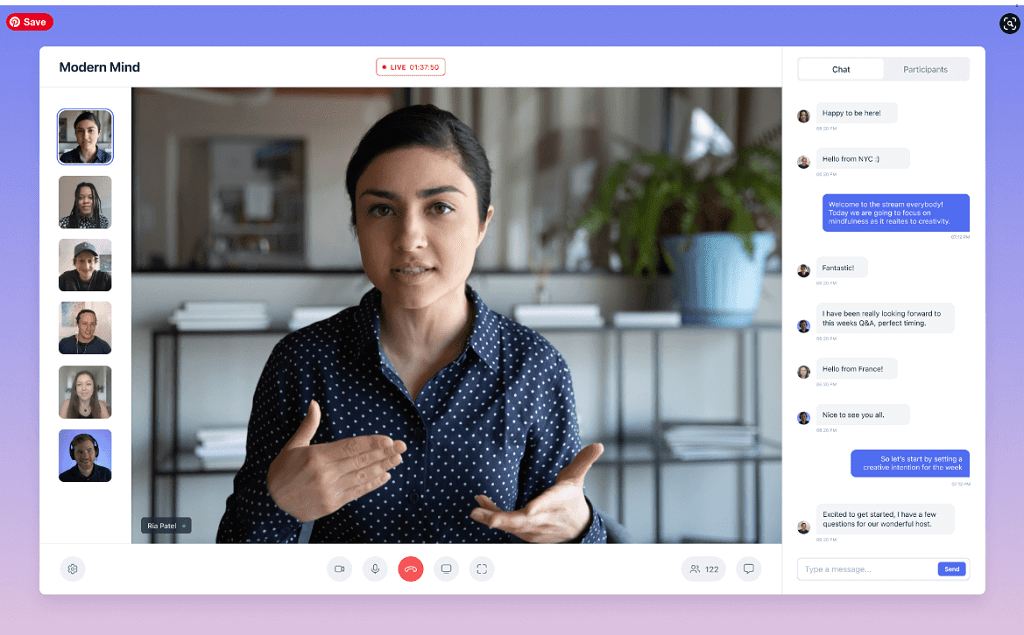
Circle is a simplicity in itself. It is not Facebook, and that makes it strong. Coaches, professionals, teachers take advantage of having it to deal with private groups, provide subscriptions, as well as live sessions – with no distractions whatsoever in a clean environment.
Best for: Coaching programs, masterminds, private paid groups
Pros:
- Polished UI that feels light and modern
- Built-in video calls, livestreams, and event scheduling
- Stripe integration for easy monetization
- Active community support and regular updates
Cons:
- Some limits on deep design customization
- No standalone app branding unless you pay for Enterprise
Flexibility: Good for content and engagement, less so for tech customization
Scrile Connect — Best for fully custom social platforms with monetization
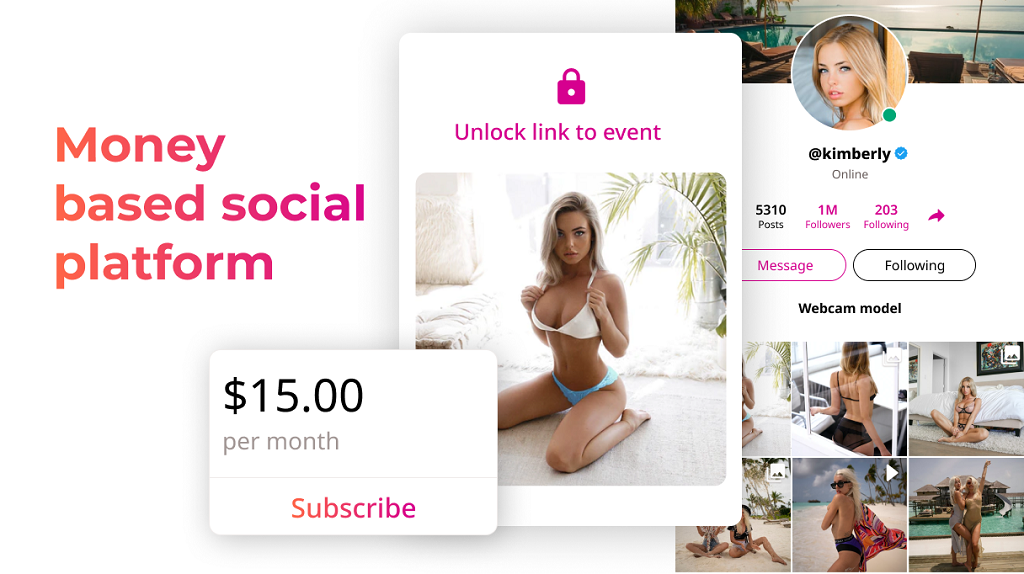
Scrile Connect isn’t another SaaS platform with a template you have to work around. It’s a full-on software development service that builds your own white label social media platform from scratch — designed around your audience, your rules, and your brand.
Instead of buying into someone else’s features, you’re choosing what to build — whether it’s a creator network, adult website such as OnlyFans, or a high-converting premium fan club. You control the interface, the monetization logic, the language, even the database. Scrile Connect gives you a team of developers, not just a dashboard.
Best for: Entrepreneurs, adult content creators, or media brands who want 100% ownership and flexibility
Pros:
- Tailor-made UX/UI, not limited by themes or widgets
- Full branding, from URL to payment gateway
- Built-in monetization: subscriptions, pay-per-post, tipping, video sales
- Supports adult content, multilingual sites, and custom policies
- No recurring platform fees or revenue cuts
Cons:
- Requires upfront budget and planning — it’s real custom dev work
- You’ll need to actively define what you want
Flexibility: Unlimited — every button, block, and feature is up to you
Conclusion: Don’t Just Join the Network — Own It
With a white label social media platform, you are entirely in charge— of content, of members, of revenues, of branding. No algorithms. No third-party go-between. Only your space, your community, your rules. After having enough of fitting into a formula of another person, it is time to forge your own with Scrile Connect.
Turn community engagement into predictable income. Build an OnlyFans-like social platform with feeds, DMs, memberships, and PPV—then fine-tune retention and LTV with built-in analytics.
FAQ
What is white label social media?
It’s a social media platform you can rebrand and fully customize to launch under your own name — from design to features.
What are white label platforms?
These are prebuilt tools or frameworks that let you create your own product or service without starting from zero.
What is a white label community platform?
It’s a ready-to-customize app for building branded communities — think groups, feeds, messaging, all under your control.
Read also
| Article | Why it’s worth reading |
|---|---|
| Top 5 Niches for Best White-Label SaaS | If you’re thinking about launching a platform, this guide helps you see which niches work best with white-label SaaS so you don’t waste time on models with weak unit economics. |
| White Label Crypto Payment Gateways & Strategies 2026 | Scrile | If your audience prefers crypto, this piece explains how white-label crypto gateways integrate with your platform, what risks to consider, and how to keep payouts under control. |
| White Label Live Chat: Top 5 Platforms | Any serious SaaS or community needs real-time support or communication. This article compares white-label live chat solutions you can embed directly into your own product. |
| Top Integrations for Content Services | When your platform grows, integrations become critical. This guide shows which content services (storage, processing, protection, analytics) are worth connecting to your white-label stack. |
